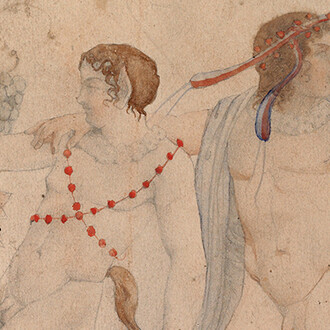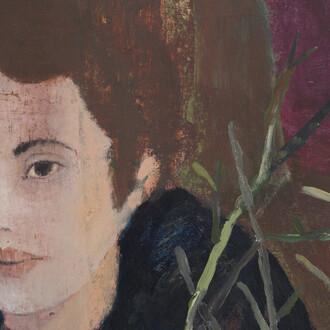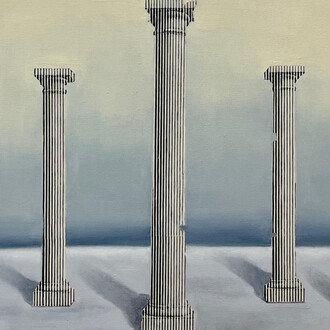From 17 October 2024 to 2 March 2025, the Musée Marmottan Monet will present an exhibition entitled: Trompe-l’oeil, from 1520 to the present day. This exhibition traces the history of the representation of reality in the arts and seeks to pay tribute to a little-known facet of the Museum’s collections, while shining a light on Jules and Paul Marmottan’s penchant for this pictorial genre.
The French term trompe-l’oeil is believed to have been used for the first time by Louis Léopold Boilly (1761-1845) in the caption of a work exhibited at the 1800 Salon. The term was adopted thirty-five years later by the Académie Française. Although the term appeared in the 19th century, the origin of trompe-l’oeil is linked to a much older account, that of Pliny the Elder (c.23-79 AD), who reported in his Natural History that the painter Zeuxis (464-398 BC), in a competition against another painter by the name of Parrhasios, represented grapes so perfect that birds came fluttering around them!
Over the centuries, trompe-l’oeil has been used in various media and has proven to be multifaceted. Not only does it play with the viewer’s gaze, but it is a nod to the potential traps set by our own perceptions. If certain themes of trompe l’oeil are well-known—vanities, hunting trophies, letter holders or racks, and grisailles—other aspects will be explored in this exhibition, such as the decorative variations on furniture, pottery, etc., and even the political significance of this pictorial genre from the revolutionary period up to the modern and contemporary day.
More than eighty key works ranging from the 16th to the 21st century, coming from both private and public collections in Europe and the United States (National Gallery of Art in Washington, Museo nacional Thyssen-Bornemisza in Madrid, the Musée d’art et d’histoire in Geneva, the Museo dell’Opificio delle Pietre Dure in Florence, the Château de Fontainebleau, the Louvre, the Musée de l’Armée, Musée national de la Céramique in Sèvres, the Fondation Custodia, the Palais des Beaux-Arts in Lille, the Musée Unterlinden in Colmar, etc.) will be on display, allowing visitors to understand the formal evolution of the trompe l’oeil genre.
Martin Battersby, Louis Léopold Boilly, Henri Cadiou, Guillaume Dominique Doncre, Pierre Ducordeau, Daniel Firman, Piero Fornasetti, Johann Caspar Füssli, Gaspard Gresly, Cornelis Norbertus Gysbrechts, John Haberle, William Harnett, Jean Antoine Houdon, Nicolas de Largillière, Jean-François de Le Motte, Jean-Etienne Liotard, Cristoforo Munari, Jean-Baptiste Oudry, Giuseppe Penone, John Frederick Peto, Michelangelo Pistoletto, Jacques Poirier, Christian Renonciat, Pierre Roy, Lisa Sartorio, Piat Joseph Sauvage, Daniel Spoerri, and Anne Vallayer-Coster are just some of the masters featured in this exhibition celebrating the art of illusion, based on a great deal of skill and technique.
For the exhibition, eight works from the Museum’s collection have been restored and will be presented to the public. These include Trompe-l’oeil (1665) by Cornelis Norbertus Gysbrechts (1630 – c. 1675), Trompe-l’oeil: portrait de Madame Chenard, grisaille à l’imitation de l’estampe (1813) by Louis Léopold Boilly (1761-1845), and the piece also known as the Traité de paix définitif entre la France et l’Espagne (1801) by Laurent Dabos (1761-1835).
The exhibition is divided into eight sections, which illustrate in a chronological fashion, the plurality of sensibilities and representations of the trompe l’oeil genre, as well as its evolution over time.
(Scientific curator: Sylvie Carlier, curator of collections, Musée Marmottan Monet. Associate curator: Aurélie Gavoille, curatorial assistant, Musée Marmottan Monet)


![John Frederick Peto, Le vieux violon [The old Violon], ca. 1890. Courtesy of Musée Marmottan-Claude Monet](http://media.meer.com/attachments/b17702baf332003de9613aab6085c20af5c602a2/store/fill/410/615/c6dad2480b74e147b8d68cc50abb1d26687603e6e1b8f9856b3ef468d814/John-Frederick-Peto-Le-vieux-violon-The-old-Violon-ca-1890-Courtesy-of-Musee-Marmottan-Claude.jpg)

![John Frederick Peto, Pour la piste [for the track], 1895. Courtesy of Musée Marmottan-Claude Monet](http://media.meer.com/attachments/d7ad9320f5def40f32e12871303bc14ac7c09f33/store/fill/410/615/966e6c06923212d3a725003782cf3c5b9fd47a453ccdff72bc7fa9847897/John-Frederick-Peto-Pour-la-piste-for-the-track-1895-Courtesy-of-Musee-Marmottan-Claude-Monet.jpg)











